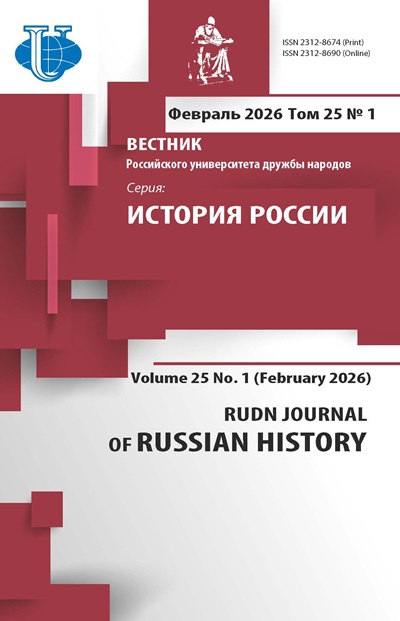WEST AND RUSSIA IN THE SECOND PART OF THE 15TH-17TH CENTURIES: POLITICAL FORMS OF MUTUAL ACTION
- Authors: Georgieva N.G1, Chernikova T.V2
-
Affiliations:
- RUDN University
- University of the Ministry of Foreign Affairs of the Russian Federation
- Issue: Vol 17, No 2 (2018): JEWS IN RUSSIA
- Pages: 462-481
- Section: DISCUSSION
- URL: https://journals.rudn.ru/russian-history/article/view/19110
- DOI: https://doi.org/10.22363/2312-8674-2018-17-2-462-481
- ID: 19110
Cite item
Full text / tables, figures
Abstract
Global History is one of the phenomena and a consequence of the process of globalization, stimulating intercultural dialog as the basis for improved mutual understanding between people. Numerous modern historians recognize that there is a need to abandon the construction ‘the West and the Rest’ that has dominated for a long time in the historiography. Global History should focus on the study of communication and interaction between governments and nations. Modern historiography refers the beginning of a process of globalization to the 15th century. In connection with this chronological milestone this essay considers the initial phase of the process establishing sustainable relationships between Western Europe and Russia. It began in the second half of the 15th century. In the 17th century all the contacts with Western Europe became a constant of Russian socio-cultural devices and one of the phenomena of Russian history. Despite the support provided to aliens by the Russian government, relationship of the foreigners with the Russian society was contradictory. However, by the end of the 17th century, in attitude of Russian society to everyone who had come from the West began to develop two parallel lines. A negative attitude to the innovation and commitment to old, spiritual and household traditions remained by the peasantry and part of the elite of society. The urban population and the other part of the noble elite of society showed tolerance and willingness to accept much of the new that had appeared in Russia thanks to its rapprochement with the West.
About the authors
Natalia G Georgieva
RUDN University
Email: navladi@list.ru
6 Mikluho-Maklaya St., Moscow, Russia, 117198
Tatiana V Chernikova
University of the Ministry of Foreign Affairs of the Russian Federation
Email: tchernikova@mail.ru
76, Vernadsky prospect, Moscow, Russia119454
References
- Chakrabarty, Dipesh. “Postcoloniality and the Artifice of History.” In Provincializing Europe: Postcolonial Thought and Historical Difference, 27-46. Princeton: Princeton University Press, 2000 (in Russian)
- Chernikova, Tatiana V. Europeizatsiya Rossii vo vtoroy polovine XV - XVII vekakh [Europeanization of Russia in the second half of the 15th to 17th centuries]. Moscow: Moskovsky gosudarstvennyi institute mezhdunarodnykh otnosheniy (universitet) MID Rossii Press, 2012 (in Russian)
- Evans, J. Herodotus: Explorer of the Past. Princeton: NJ, 1991
- Global Economic History Network 2011. Mission Statement. http://www.2.ise.ac.uk/economicHistory/Research/GEHN/network/GEHNMission.aspx
- Herberstein, S. Zapiski o Moskovii [The Notes on Muscovy]. Moscow: MGU University Press, 1988 (in Russian)
- Iggers, George J., and Q. Edward Wang. A Global History of Modern Historiography. Harlow; England: Pearson Longman, 2008
- Mazlish, Bruce. “Comparing Global History to World History.” Journal of interdisciplinary history 28, no. 3 (Winter 1998): 385-395
- Marshall, Poe. The Use of Foreign Descriptions of Russia as Sources for Muscovite History: A Methodological Guide. http://works.bepress.com/marshall_poe/44
- O’Brien, Patrick. “Global History for Global Citizenship.” Global History and Maritime Asia Working and Discussion Paper Series, Working Paper, no. 7 (2008). http://www. history.ac.uk/makinghistory/resources/article/global_history.html
- Poe, Marshall. Foreign descriptions of Muscovy. An Analytic Bibliography of Primary and Secondary Sources. Columbus, Ohio: Slavica Publishers, 1995
- Shestova, Tatyana L. “Global History as a Trend of Global Studies.” In Globalistics, Global Studies, Globalization Studies. Moscow: Max-Press, 2012 (in Russian)
- Vorob’eva, Ol’ga V. “Istorii istoriografii kontsa XVIII - nachala XXI v. V svete knigi G. Iggersa i E. Vana ‘Global’naya istoria sovremennoy istoriografii’.” [Histories of historiography, the late 18th - early 21st cc. in the context of the ‘Global history of modern historiography’ by George J. Iggers and Q. Edward Wang’] Dialog so vremenem 37 (2011): 45-65 (in Russian)
- Voronin, Sergey A. “Protsess globalizatsii ili proekt neoliberalizma? Chto nas ozhidaet.” [The process of the globalization or neo-liberal project? What awaits us] RUDN Journal of World History 7, no. 4 (2015): 7-18 (in Russian)
- Wolf, Eric. Europe and the People without History. Berkeley: CA, 1982
- Zolotukhin, M.Yu., Georgiev, V.A., and Georgieva N.G., Istoriya mezhdunarodnykh otnosheniy i vneshney politiki Rossii v Novoe vremya. XVI - nachalo XIX veka [The History of international relations and Exterior Policy of Russia in the New Time. The 16th - early 19th century]. Moscow: INFRA-M Publ., 2015 (in Russian)
Supplementary files














